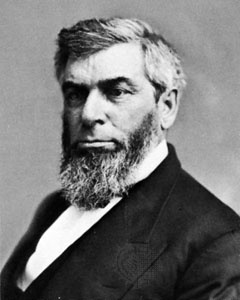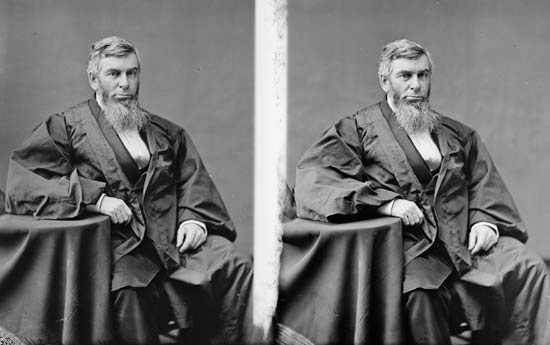Waite, Morrison Remick
chief justice of United States
born Nov. 29, 1816, Lyme, Conn., U.S.
died March 23, 1888, Washington, D.C.
 seventh chief justice of the United States (1874–88), who frequently spoke for the Supreme Court in interpreting the post-Civil War constitutional amendments and in redefining governmental jurisdiction over commerce in view of the great expansion of American business. Reacting against the extreme nationalism predominant during the Civil War and in the early Reconstruction years, the Waite court did much to rehabilitate the idea of states' rights.
seventh chief justice of the United States (1874–88), who frequently spoke for the Supreme Court in interpreting the post-Civil War constitutional amendments and in redefining governmental jurisdiction over commerce in view of the great expansion of American business. Reacting against the extreme nationalism predominant during the Civil War and in the early Reconstruction years, the Waite court did much to rehabilitate the idea of states' rights.The son of a justice of the Connecticut Supreme Court, Waite practiced law in Toledo, Ohio. In 1871–72 he became nationally prominent as one of the U.S. counsels to the Alabama arbitration commission at Geneva, dealing with Great Britain's liability to the United States for permitting Confederate warships to be built and serviced in British ports. The favourable impression he made on President Ulysses S. Grant at that time led to his appointment as chief justice by Grant on Jan. 19, 1874.
 Waite's most famous opinion was Munn (Munn v. Illinois) v. Illinois, 94 U.S. 113 (1877), one of a group of six Granger cases involving Populist-inspired state legislation to fix maximum rates chargeable by grain elevators and railroads. Against the assertion that the Granger laws constituted deprivation of private property without due process of law and conflicted with the Fourteenth Amendment (1868), Waite borrowed a phrase from Sir Matthew Hale, lord chief justice of England (1671–76), to hold that, when a business or private property was “affected with a public interest,” it was subject to governmental regulation.
Waite's most famous opinion was Munn (Munn v. Illinois) v. Illinois, 94 U.S. 113 (1877), one of a group of six Granger cases involving Populist-inspired state legislation to fix maximum rates chargeable by grain elevators and railroads. Against the assertion that the Granger laws constituted deprivation of private property without due process of law and conflicted with the Fourteenth Amendment (1868), Waite borrowed a phrase from Sir Matthew Hale, lord chief justice of England (1671–76), to hold that, when a business or private property was “affected with a public interest,” it was subject to governmental regulation.In several cases concerning the recently freed and supposedly enfranchised blacks, Waite held that the privileges and immunities of U.S. citizens had not been increased by the Fourteenth Amendment and that neither it nor the Fifteenth Amendment (1870) had given Congress extensive power to safeguard civil rights. In United States v. Cruikshank, 92 U.S. 542 (1876), he stated that, despite its apparently plain language, the Fifteenth Amendment had not conferred a federal right of suffrage on blacks, because “the right to vote comes from the states.” In Hall v. De Cuir, 95 U.S. 485 (1878), he struck down, as a “direct burden” on interstate commerce, a Louisiana Reconstruction statute requiring full racial integration of passengers by common carriers. In Reynolds v. United States, 98 U.S. 145 (1878), in upholding the application of antipolygamy laws to Mormons, Waite distinguished between the freedom to hold a religious belief and the freedom to engage in religious practices (polygamy) that had been outlawed by legislative act.
Waite tried to establish a nonpolitical conception of the chief justiceship. In 1876 he might have had the Republican Party's nomination for president, but he rejected it because, in his view, his candidacy would detract from the court's prestige.
- Terry McGovern
- Terry McMillan
- Terry, Samuel
- Terry Sawchuk
- Terry, Sonny
- Terry Southern
- Terry-Thomas
- Tertiary Period
- tertulia
- Tertullian
- Teruel
- Terzaghi, Karl
- terza rima
- Teschen
- teschenite
- Teschner, Richard
- Teshio-sammyaku
- Teshub
- tesla
- Tesla, Nikola
- Teso
- tessellated pavement
- tessera
- Tess Gallagher
- Tessin, Carl Gustaf, Greve